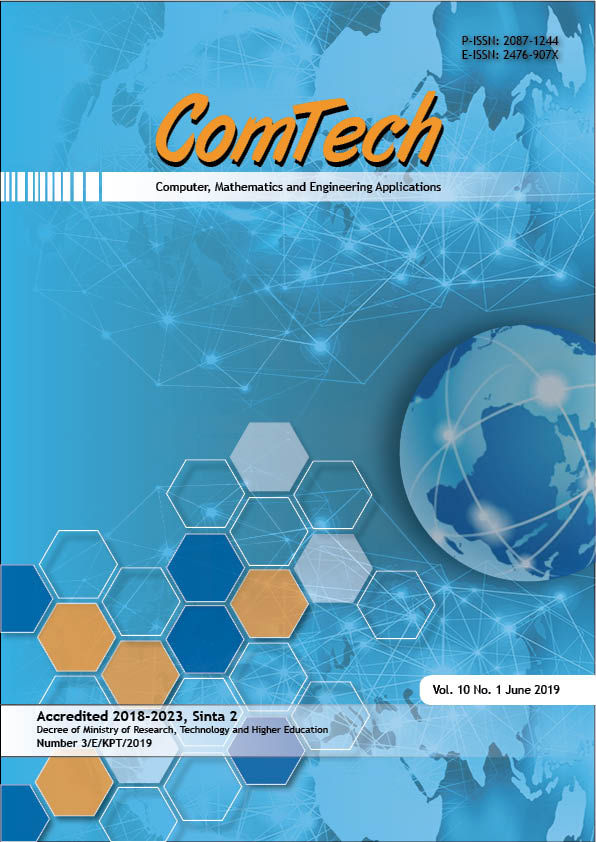Web-Based Expert System to Detect Stress on College Students
DOI:
https://doi.org/10.21512/comtech.v10i1.4987Keywords:
web-based expert system, stress detection, college studentsAbstract
This research aimed to make the application to detect stress for the college students. By early detecting stress on college students, it could help them to cope with their stress and avoid the negative impact of the stress. The Holmes-Rahe Readjustment Rating Scale was used to detect stress based on student’s life events. Each event had its score. There were 31 questions provided by the system. The final score would conclude the stress categories. Using the Forward Chaining Inference Engine, the system would collect the fact of the student’s life and give the result by accumulating scores on questions posed to the users from every question. The system also provided the reminder feature that led to continuous monitoring of stress condition in the students. About 65 correspondents who were selected using random sampling were asked to fill out questionnaires regarding this system after they tried the application. With the continuous monitoring, the researchers find that this system gives a result that all users have decreased their score of stress levels. Moreover, the correspondents rate that the design of the application is good enough, and the system is interesting and useful for helping students to provide a solution for stress.
References
Allexandre, D., Bernstein, A. M., Walker, E., Hunter, J., Roizen, M. F., & Morledge, T. J. (2016). A webbased mindfulness stress management program in a corporate call center: A randomized clinical trial to evaluate the added benefit of onsite group support. Journal of Occupational and Environmental Medicine, 58(3), 254-264. https://doi.org/10.1097/JOM.0000000000000680
Billings, D. W., Cook, R. F., Hendrickson, A., & Dove, D. C. (2008). A web-based approach to managing stress and mood disorders in the workforce. Journal of Occupational and Environmental Medicine, 50(8), 960-968. https://doi.org/10.1097/JOM.0b013e31816c435b
Chakraborty, A. K., Ghorai, A. K., De, R. K., Chakraborty, S., Jha, S. K., Mitra, S., & Goswami, K. K. (2013). Expert system for integrated stress management in Jute (Corchorus olitorius L. and C. capsularis L.). International Journal of Bio-Resource and Stress Management, 4(2), 192-200.
Felsten, G. (2004). Stress reactivity and vulnerability to depressed mood in college students. Personality and Individual Differences, 36(4), 789-800. https://doi.org/10.1016/S0191-8869(03)00152-1
Gaol, N. T. L. (2016). Teori stres: Stimulus, respons, dan transaksional. Buletin Psikologi, 24(1), 1-11.
Haidar, S. A., de Vries, N. K., Karavetian, M., & El-Rassi, R. (2018). Stress, anxiety, and weight gain among university and college students: A systematic review. Journal of the Academy of Nutrition and Dietetics, 118(2), 261-274. https://doi.org/10.1016/j.jand.2017.10.015
Meyer, G. J., Finn, S. E., Eyde, L. D., Kay, G. G., Moreland, K. L., Dies, R. R., ... & Reed, G. M. (2001). Psychological testing and psychological assessment: A review of evidence and issues. American Psychologist, 56(2), 128-165. https://doi.org/10.1037/0003-066X.56.2.128
Oguntimilehin, A., Abiola, O. B., & Adeyemo, O. A. (2015). A clinical decision support system for managing stress. Journal of Emerging Trends in Computing and Information Sciences, 6(8), 436-442.
Sevani, N., & Silvia, S. (2015). Web deteksi gangguan kecemasan dan depresi. ULTIMATICS, 7(1), 20-26.
Silitonga, D. V., & Budiharto, W. (2015). An expert system of measurement of individual knowledge for teeth treatment. International Journal of Software Engineering and Its Applications, 9(4), 11-18.
Subawa, I. G. B., Wirawan, I. M. A., & Sunarya, I. M. G. (2015). Pengembangan sistem pendukung keputusan pemilihan pegawai terbaik menggunakan metode Simple Additive Weighting (SAW) di PT Tirta Jaya Abadi Singaraja. KARMAPATI (Kumpulan Artikel Mahasiswa Pendidikan Teknik Informatika), 4(5), 24-33.
Downloads
Published
How to Cite
Issue
Section
License
Authors who publish with this journal agree to the following terms:
a. Authors retain copyright and grant the journal right of first publication with the work simultaneously licensed under a Creative Commons Attribution License - Share Alike that allows others to share the work with an acknowledgment of the work's authorship and initial publication in this journal.
b. Authors are able to enter into separate, additional contractual arrangements for the non-exclusive distribution of the journal's published version of the work (e.g., post it to an institutional repository or publish it in a book), with an acknowledgment of its initial publication in this journal.
c. Authors are permitted and encouraged to post their work online (e.g., in institutional repositories or on their website) prior to and during the submission process, as it can lead to productive exchanges, as well as earlier and greater citation of published work.
 USER RIGHTS
 All articles published Open Access will be immediately and permanently free for everyone to read and download. We are continuously working with our author communities to select the best choice of license options, currently being defined for this journal as follows:
























